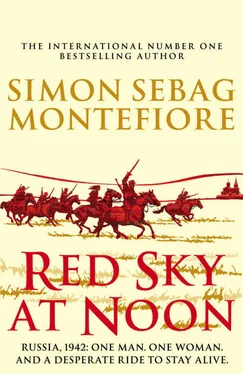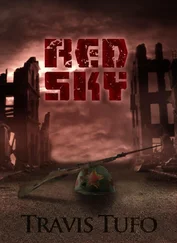MORE GOLD FOR OUR SOCIALIST PARADISE!
Early next morning, the first roll call, hundreds of men standing to attention in the mist: pairs of favoured prisoners – known as Camp Trusties – waved whips and bully sticks to herd them into work brigades. The brigadiers reported to the Commandant. ‘There are twenty-seven in this brigade,’ called out Benya’s brigadier, a Criminal called Shurik. ‘One died at the mine yesterday; one executed for insubordination. One dead this morning in barracks; two sick in barracks; one self-injured in the Isolator. Five new prisoners. Total: twenty-seven!’ He marched them up to the mine. ‘You work, you eat,’ Shurik warned Benya and his fellow Zeks – that was the Camp nickname for prisoners. ‘You don’t work, Zeks, you die.’ Facing Benya was a capacious and gigantic scoop of mud and rock carved out of the mountainside, an ants’ nest of teeming workers and armed guards, all creeping along plank walkways or excavating deep gulches, tiny figures in a landscape that the Zeks already called the Dark Side of the Moon.
‘Bandits, today your training is over,’ announced Penal-Colonel Melishko, the battalion commander. How Benya had survived his time in Kolyma he never knew, and here he was eighteen months later, in July 1942, in southern Russia, not far from the city of Stalingrad.
At sundown on that broiling summer night, they stood in a half-circle around Melishko in the manège of the Marshal Budyonny Stud Farm Number 9, very close to the Don River. It was horse country, land of the Don Cossacks. They had been training for seven months.
‘You are ready to be assigned your first mission – and you will be needed faster than any of us thought. The Motherland is in peril!’ roared Melishko.
Benya caught the eye of his friend Prishchepa next to him. Prishchepa smiled flashily, but Melishko’s gruff confidence did not hide the panic of the other officers. When Benya had started his training in December 1941, the front was far away and the Germans had been defeated outside Moscow. Now the war had come to them; since yesterday, they could even hear the belch of artillery as the Germans approached the Don.
‘You bandits have a special reason to fight hard for the Motherland! I found you as scum. Now you’re as battle-ready as regulars, good soldiers, fine horsemen’ – Melishko’s eyes, under his crescent-shaped eyebrows that looked like wings, glanced at Benya with a stroke of warmth – ‘and even the most unlikely of you can at least keep your seat.’
Prishchepa wiped away the tears that ran down his young cheeks. He wept and laughed easily; he went through life as happy as a swallow; nothing disturbed his geniality, not his sentence to the Camps, nor this parade today, nor tomorrow’s battle. ‘Life is easy for a simple soul like mine,’ he said cheerfully. ‘You just have to live it.’ Benya enjoyed studying Prishchepa; he’d never lost his interest in human nature, and there was no laboratory so fascinating as the Gulags and this battalion of vicious criminals and court-martialled soldiers.
Benya and Melishko had been in the same Camp in Kolyma. After his arrest, General Melishko had been so severely tortured that he had no teeth or fingernails left; only his moustache, thick, white and stiff as a painter’s old brush, was the same. Nevertheless when the war started, he had been one of the first officers recalled to fight but instead of being assigned a division or corps, he had been made a colonel and given this rabble. He was, however, still called ‘the General’ by everyone and Benya loved the fact that Melishko was unchanging, whether waiting for soup in the dining block in Kolyma or addressing the men as an officer.
In the barn-like manège, its sandy ground designed for training horses, Melishko stood alone at the front. Behind him: Captain Ganakovich, their Politruk, the Political Officer, and Pavel Mogilchuk, head of their secret police Special Unit.
Benya did not know the details – the truth was always ‘ Top Secret ’ – but he did know the Russians were retreating fast and now there must have been some new debacle. Ganakovich was fritzing with nerves, Mogilchuk visibly shaking. At each crump of the guns, the fear slithered another degree up Benya’s belly.
‘Remember what I always say,’ bellowed Melishko, his false teeth breaking the vowels. ‘You can’t get me!’ It was a line borrowed from his favourite movie and the men loved it.
‘Urrah!’ they cried but then there was the sound of footsteps and Benya peered round as Captain Zhurko ran into the manège and handed Melishko a piece of paper.
‘As you are,’ said Melishko. ‘We’re awaiting an important order from Stavka.’ ‘Stavka’ was headquarters in Moscow. Benya and Prishchepa looked at each other, and Prishchepa started to sing under his breath: ‘ Don’t circle over me, black raven …’
Far to the north, in Moscow, a small, tired old man, wearing a military tunic and baggy grey trousers tucked into soft calfskin boots, sat at a huge desk in a long office. His face was seared with exhaustion, bleached a sallow pockmarked grey.
Outside, the Kremlin was draped in camouflage netting, and air balloons floated above the city to disorientate German bombers. Inside, the long table, the desk with the T-shaped extension and the chunky row of Bakelite telephones, the dreary drapes over the windows and the illuminated death mask of Lenin on the wall were unchanged, but now the founder of Soviet Russia was joined on the walls by oil paintings of Tsarist paladins, Suvorov and Kutuzov. This office known to regulars as the Little Corner was the headquarters of the Soviet armies, and the phone lines and telegraph wires in the communications room next door linked the man in this office to a boundless and often unpredictable and uncontrollable world of savage struggle between millions of men.
‘We were tricked,’ said Stalin quietly. ‘The whole south is collapsing. Our commanders are fools and yes-men. We lack good men. We still await the main offensive against Moscow.’
At the nearest end of the long table sat three men. Molotov, a squat blockhouse with a round head and pince-nez, nodded. The only one in civilian clothes, he wore a grey suit, grey tie and stiff white collar. He had the clammy pallor of the bureaucrat who never saw the sun, a condition known to Stalin’s familiars as ‘the Kremlin tan’.
‘You’re right, Comrade Stalin,’ said Lavrenti Beria, the People’s Commissar of Internal Affairs, chief of the secret police. Wearing his blue-tabbed NKVD uniform, he was broad-spanned and grey-faced but bristling with ingenuity, vigilance, ferocity.
The third of them, Hercules Satinov, dressed as an army colonel general, spoke up: ‘Comrade Stalin, I believe this is the main German offensive. They are throwing everything against the Don and the Caucasus. We made the wrong judgement. There is no Moscow offensive. I myself was mistaken and I wish to take responsibility, and if you believe it necessary, stand trial. We were tricked…’
Stalin stared witheringly at Satinov for a long moment. Until today, he might have called him a fool, a traitor, perhaps even ordered his arrest. But Satinov, his favourite and, like him, another Georgian, had always told him the truth. And now he needed the truth. Six weeks earlier, on 19 June, a German Storch plane had crashed behind Soviet lines near Kharkov. Inside was a staff officer, Major Reichel, with a briefcase that contained the plans for Hitler’s southern offensive, Case Blue. Hours later, those plans were reviewed in this very room by Stalin, accompanied by the same Greek chorus of Molotov, Beria and Satinov.
Читать дальше












